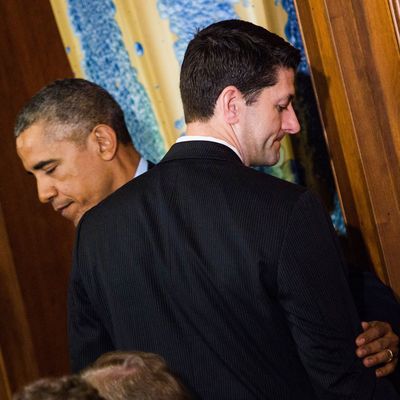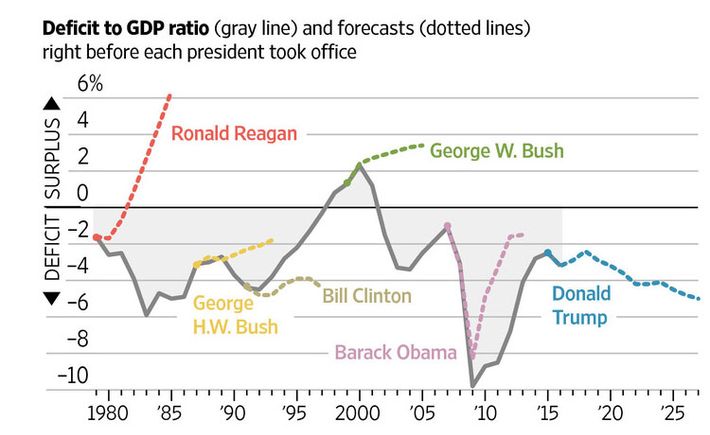
Paul Ryan spent eight years under Barack Obama issuing dire warnings of an impending fiscal crisis. While not quite severe enough to justify trading even small increases in tax revenue for spending cuts — no crisis could be that dire to Paul Ryan — the deficit was still a civilizational calamity. Ryan repeatedly promised his party would solve the problem if given power. Now Republicans have the power. Ryan is no longer promising to save the Republic from the Greece-like fate in store for our people. Indeed, when reporter Steve Dennis asked Ryan the other day if he would merely promise not to increase the budget deficit, Ryan refused to commit to clearing even that low bar.
Ryan is carrying on the modern Republican tradition of demanding fiscal austerity in opposition and implementing fiscal promiscuity in power. This chart, via The Wall Street Journal, shows an interesting pattern. The dotted, colored lines depict the projected deficit or surplus every president since Ronald Reagan has faced since entering office:

Reagan and George W. Bush didn’t run on platforms of creating big deficits. Quite the contrary: Reagan campaigned by denouncing Jimmy Carter’s alleged fiscal irresponsibility. Bush promised to pay off the entire national debt. Both presidents enjoyed favorable forecasts for surpluses, which they used to pass enormous tax cuts and military buildups. The favorable budget forecasts they inherited gave them free money to play with, letting them put their imprint on the government without the painful tradeoffs that would limit their options. Obama entered office facing a $1.2 trillion deficit projection, which subjected all his long-term budget changes (after the immediate, one-time fiscal stimulus) to the requirement that they reduce the debt. Obamacare would have been a much easier law to write if Obama had put the whole thing on the national credit card, the way Bush financed Medicare Part D, rather than prying every last dollar out of Congress.
Trump won’t have as bad a situation as Obama, but neither does he enjoy the same luck as Reagan and George W. Bush. He has a deficit running toward 5 percent of the economy. Trump wants to pass huge tax cuts, infrastructure, a military buildup, plus of course terrific health care for everybody without any of the terrible things in Obamacare that pay for it. Whether Trump will hit his limit when the deficit is at 5 percent of GDP or 6 percent or 8 percent, it will come.
There is another conclusion to draw from this. Obama faced unrelenting pressure throughout his presidency to make a deal to cut the deficit. The default position of centrist pundits over the course of his first term and a half was that the definition of success was a bipartisan debt agreement. This was bad fiscal policy during the first few years, when the economy was recovering from the biggest economic crisis in three-quarters of a century. And in any case it was impossible to get a deal with a Republican Party that refused to make any concessions on revenue.
But the dynamic facing Trump indicates yet another reason why it’s a good thing Obama didn’t strike that deal. The better the budget forecast he left, the more leeway he would have given the Republicans to give the money away in the manner of their choosing. That’s what happened when Bill Clinton left Bush a huge surplus — Bush dissipated it on Republican priorities. Trump would have done the same thing if Obama had left him a balanced budget.
The fabled bipartisan commitment to fiscal responsibility only works if both parties actually care about it. If one party only cares about low taxes, and pretends to care about deficits when the other party controls government, then the budget is an iterative game where using your political capital to reduce the deficit is a sucker’s play.






























